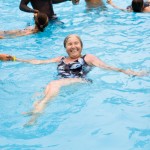This article is brought to you by Maggie Ayre. Maggie is the UKs Leading Fitness Coach for Teenage Girls. She has recently developed the 3G Program designed to be run in schools and youth clubs with the aim to get every teen girl active. She also offers Personal Training for Teenage Girls in person and via email, skype and video sessions. To learn more visit: www.maggieayre.com
Active-aging expert offers “e-tips” for attaining and maintaining health.
Whether you’re turning 30, 40, 50, 65, or 90, there’s no reason to assume you’re doomed to decline after a certain age—especially if you’re doing everything you can to stay healthy and active.”
Colin Milner, CEO of the International Council on Active Aging offers the following “E-tips” to help you extend a healthy life, or embark on one if you haven’t yet done so.
Expectations. If you’ve been following a healthy lifestyle up ’til now, simply keep going; if you need to make changes, anticipate succeeding, not failing—and don’t let age be a barrier. Research has shown that thinking positively about getting older can extend your life by as much as 7.5 years.
Enthusiasm. Few people are thrilled with every aspect of their lives, but many have at least one area—family, friends, work, avocation—they feel good about. Identify an activity or connection that sparks your enthusiasm and make it your lifeline; try to extend that enthusiasm to other areas of your life.
Energy. Having the energy and motivation you need to age well are hallmarks of healthy living. If you’re fatigued all the time, don’t let apathy and lethargy bring you down; pursue a check-up to try to determine the cause—and the solution.
Eating. Eating a balanced diet and attaining/maintaining a normal weight are keys to physical and mental health; if you need to lose weight or make changes in your diet, keep your expectations high—you can do it.
Exercise. Staying physically active fuels the body and mind. If you’re already exercising regularly, keep it up; if you’re getting started, know your skill level, set goals, progress at your own pace, and be consistent.
Engagement. Volunteers have higher levels of well-being and life satisfaction than those who don’t volunteer; volunteering and other forms of civic and social engagement can play an important role in maintaining good health in later life. “Get involved,” Milner urges.
Emotions. Everyone feels down at times, but full-blown depression is a major cause of disability. If you’re feeling out of sorts for two weeks or more, talk with your doctor or take an online screening test at www.mentalhealthscreening.org/. In many instances, simply exercising and eating right can improve your mood.
Education. Life-long learning is important to living an independent and fulfilling life. Start now to learn a new area of knowledge or physical activity. It’s good for the brain.
Effort. Changing expectations and embarking on a new behavior takes energy and effort, but the results are well worth it.
Enjoyment. A healthy life generally is a joyous one. “Savor the process of being or becoming active, engaged, and truly alive,” Milner enthuses.
“Now is a great time to take stock and ask yourself, where do I want to go from here?” Milner says. “Emphasize the positive and don’t let your age, or anyone else, deter you.”
Colin Milner, founder and chief executive officer of the International Council on Active Aging® (ICAA), is a leading authority on the health and well-being of the older adult. An award-winning writer, Milner has authored over 250 articles. He is a Contributing Blogger to the US Department of Health and Human Services’ Be Active Your Way Blog, and has been published in journals such as Global Policy and the World Economic Forum’s Global Risk. He recently contributed a chapter to the book Global Population Ageing: Peril or Promise? (Published by the Forum in 2012.)
 Subscribe
Subscribe